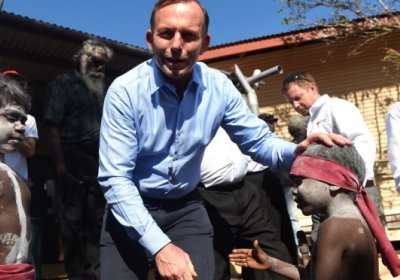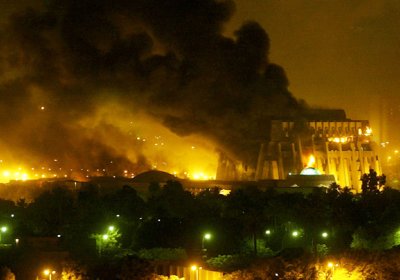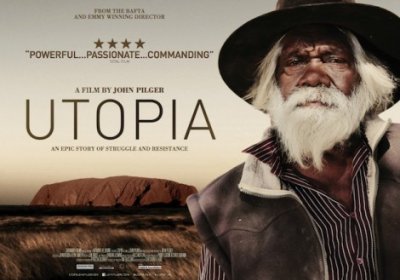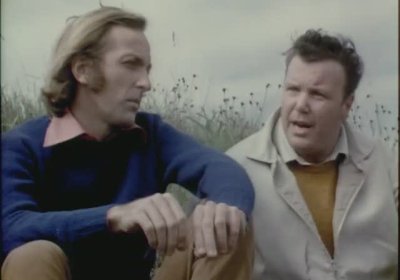There are times when farce and living caricature almost consume the cynicism and mendacity in the daily life of Australia's rulers.
Across the front pages is a photograph of a resolute Tony Abbott with Aboriginal children in Arnhem Land, in Australia’s remote north. "Domestic policy one day," says the caption, "focus on war the next."
John Pilger
“There is a taboo,” said the visionary Edward Said, “on telling the truth about Palestine and the great destructive force behind Israel. Only when this truth is out can any of us be free.”
For many people, the truth is out now. At last, they know. Those once intimidated into silence can't look away now.
Staring at them from their TV, laptop and phone is proof of the barbarism of the Israeli state and the great destructive force of its mentor and provider, the US, the cowardice of European governments, and the collusion of others, such as Canada and Australia, in this epic crime.
On my wall in London is my favourite photograph from South Africa. Always thrilling to behold, it is Paul Weinberg's image of a lone woman standing between two armoured vehicles, the infamous “hippos”, as they rolled into Soweto. Her arms are raised, fists clenched, her thin body both beckoning and defiant of the enemy.
The tape is searing. There is the voice of an infant screaming as he is wrenched from his mother, who pleads, "There is nothing wrong with my baby. Why are you doing this to us? I would've been hung years ago, wouldn't I? Because [as an Australian Aborigine] you're guilty before you're found innocent."
The child's grandmother demands to know why "the stealing of our kids is happening all over again". A welfare official says, "I'm gunna take him, mate."
Washington's role in the fascist putsch against an elected government in Ukraine will surprise only those who watch the news and ignore the historical record. Since 1945, dozens of governments, many of them democracies, have met a similar fate, usually with bloodshed.
Nicaragua is one of the poorest countries on earth with fewer people than Wales, yet under the reformist Sandinistas in the 1980s it was regarded in Washington as a "strategic threat". The logic was simple; if the weakest slipped the leash, setting an example, who else would try their luck?
The BBC's Today program is enjoying high ratings, and the Mail and the Telegraph are, as usual, attacking the corporation as left-wing.
Last month, a single edition of Today was edited by the artist and musician PJ Harvey. What happened was illuminating.
It's celebrity time again. The Golden Globes have been, and the Oscars are coming. This is a “vintage year” say Hollywood's hagiographers on cue. It isn't.
Most movies are made to a formula for the highest return, money-fuelled by marketing and something called celebrity. This is different from fame, which can come with talent. True celebrities are spared that burden.
In five-star hotels on Mumbai's seafront, children of the rich squeal joyfully as they play hide and seek.
Nearby, at the National Theatre for the Performing Arts, people arrive for the Mumbai Literary Festival: famous authors and notables drawn from India's Raj class. They step deftly over a woman lying across the pavement, her birch brooms laid out for sale, her two children silhouettes in a banyan tree that is their home.
In the late 1960s, I was given an usual assignment by the London Daily Mirror's editor-in-chief, Hugh Cudlipp. I was to return to my homeland, Australia, and "discover what lies behind the sunny face".
The Mirror had been an indefatigable campaigner against apartheid in South Africa, where I had reported from behind the "sunny face". As an Australian, I had been welcomed into this bastion of white supremacy. "We admire you Aussies," people would say. "You know how to deal with your blacks."
England is two countries. One is dominated by London, the other remains in its shadow. When I first arrived from Australia, it seemed no one went north of Watford and those who had emigrated from the north worked hard to change their accents and obscure their origins, and learn the mannerisms and codes of the southern comfortable classes. Some would mock the life they had left behind. They were changing classes, or so they thought.
The corridors of the Australian parliament are so white you squint. The sound is hushed; the smell is floor polish. The wooden floors shine so virtuously they reflect the cartoon portraits of prime ministers and rows of Aboriginal paintings, suspended on white walls, their blood and tears invisible.
The parliament stands in Barton, a suburb of Canberra named after the first prime minister of Australia, Edmund Barton, who drew up the White Australia Policy in 1901. "The doctrine of the equality of man," said Barton, "was never intended to apply" to those not British and white-skinned.
Countries are “pieces on a chessboard upon which is being played out a great game for the domination of the world,” wrote Lord Curzon, Viceroy of India, in 1898. Nothing has changed.
The shopping mall massacre in Nairobi was a bloody facade behind which a full-scale invasion of Africa and a war in Asia are the great game.
The al-Shabaab shopping mall killers came from Somalia. If any country is an imperial metaphor, it is Somalia. Sharing a common language and religion, Somalis have been divided between the British, French, Italians and Ethiopians.
- Previous page
- Page 5
- Next page











